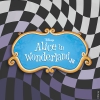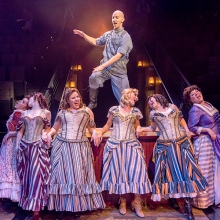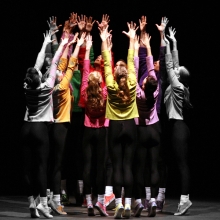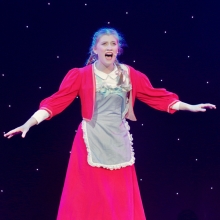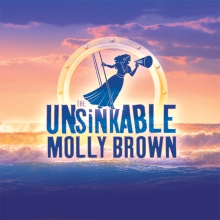Filichia Features: Merrily We Age Along

Filichia Features: Merrily We Age Along
After Franklin Shepard said "I'm 25," the audience laughed heartily.
If theatergoers give out a roar when a character gives his age, there's only one reason for it.
They don't believe him.
And the opening night crowd didn't in the Huntington Theatre Company's current production of Merrily We Roll Along. When these Bostonian theatergoers met Franklin Shepard in the first scene of the famous 1981 cult musical, the year was supposed to be 1976 when he had already said how-do-you-do to middle age; but this, as many of you know, is a show that travels backwards in time. So when it reverted to 1962, Frank didn't look substantially different.
To give actor Mark Umbers immensely deserved credit, he made his voice go higher in this scene and made his body language youthen, too. But the audience that had met him in Act One, Scene One as a 45-year-old had a hard time putting aside that perception in this Act Two scene that took place many, many moons earlier.
In the final scene -- uh, chronologically the "first" scene - it's 1957 and young would-be composer Franklin Shepard and budding playwright Charley Kringas agree to collaborate on a musical. Moments later, they'll meet their neighbor Mary Flynn, who'll become their lifelong friend (although we get the distinct impression in the first scene -- meaning the "last" one -- that her friendship with Franklin has come to an end).
To be frankly frank (as a certain revue is called), the issue of actors and age is a problem that has plagued Merrily since its first preview on Oct. 8, 1981. It was considered one of the reasons for the show's abrupt closing on Nov. 28, 1981 after 44 previews and a mere two weeks of official performances after the poisonous reviews had been published.
Harold Prince had cast the original production with young people -- ages 16 to 25 -- so they seemed fine for the final scenes (the "early" ones). But they'd seemed unconvincingly callow early on when they had to portray people pushing 50.
The first revival I saw -- at Arena Stage in 1990 -- starred Victor Garber as Frank, David Garrison as Charley and Becky Ann Baker as Mary. Their ages ranged from 37 to 41 so just as Mark Umbers couldn't pass for early 20s, neither could they.
Is a puzzlement, no? Cast too young, and Act One won't work; cast older, and you have second-act trouble.
What to do, what to do? Well, if you cast adult actors in Act One and different, younger performers as their Act Two counterparts, you avoid this problem but you give birth to another. For an audience has a harder time bonding with two performers who represent one character; this type of casting causes an artificiality that takes theatergoers one vital step away from realism.
Is this the one conundrum that has been keeping you from staging Merrily at your theater, much as you've wanted to? You may have long admired George Furth's book that expertly lays in the clues of what's to come (or, if you will, what has occurred). More importantly, his libretto has a good deal to say about the unexpected turns that life holds for us -- and just how responsible we are for them.
And then there's that Stephen Sondheim score, his warmest ever that still manages to be clever and incisive at the same time. What's more, Jonathan Tunick took some of its songs and expertly orchestrated them into The Last Great Broadway Overture, one that your orchestra (or even your one pianist) will love to perform.
After I heard the Huntington audience laugh at Umbers' claim to 25, the solution hit me. (It only took me almost 36 years and 12 times seeing the show!) But I think I have something here.
Facial hair.
It ages men.
What you should do, then, is have both Franklin and Charley wear beards and mustaches during Act One.
And remove them during intermission.
Ask anyone who once had a longtime beard and mustache and then one day shaved them off. He'll tell you that for weeks afterward, friends and relatives told him "You look so young!"
Make the beards convincing ones, though. Let's not see an overt string hanging from ear to ear. Secure them too so that they won't bounce around.
In fact, when I attended Broadway's first Merrily preview, James Weissenbach, then playing Franklin, did have facial hair in the 1968 "Old Friends" scene -- but only as a way of showing how trendy he was.
Oh, well. Everybody has to go through stages like that.
Fine, you're saying, but what about Mary? You can't put a beard and mustache on her.
Agreed. So age her with head hair. Get a good wig with a dynamic streak of white or gray a la Anne Bancroft in The Graduate. Better still, have her go the Carlotta Campion route and give her Ms. Campion's platinum hair.
You may e-mail Peter at pfilichia@aol.com. Check out his weekly column each Monday atwww.broadwayselect.comand Tuesday at www.masterworksbroadway.com . His book, The Great Parade: Broadway's Astonishing, Never-To-Be Forgotten 1963-1964 Season is now available at www.amazon.com.
Share
Callboard
-
Shake and shimmy it with the #Hairspray20Challenge! Join MTI and Broadway Media in celebrating 20 years of #Hairspray. Duet this here or find us on TikTok! Special thanks to @broadwaymedia and @jammyprod. Choreography Guides are a licensor official resource that provides step-by-step instruction from Broadway and professional choreographers for your productions! Visit @broadwaymedia to learn more. #mtishows #youcantstopthebeat #hairspraymusical #goodmorningbaltimore
View on Instagram









